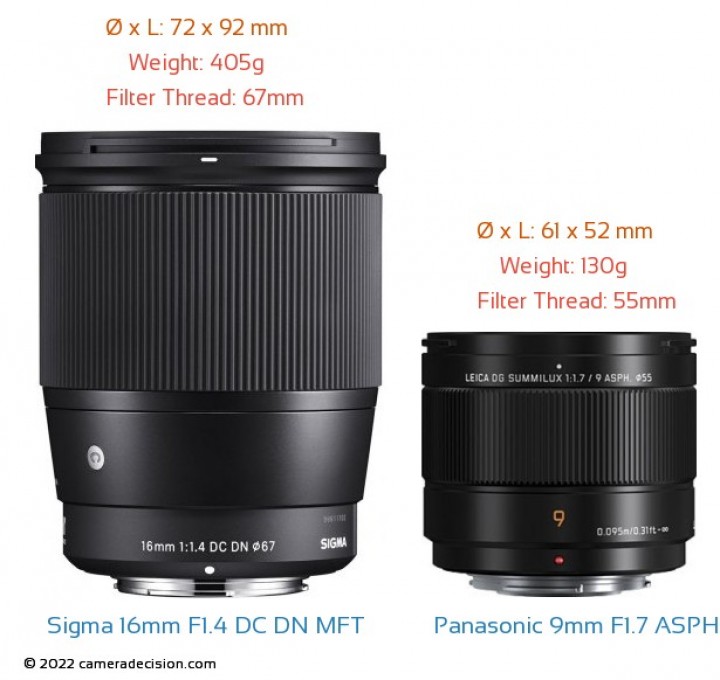The type of photography that you are planning to use is an important decision factor. Here we have evaluated the Panasonic 9mm F1.7 ASPH and the Sigma 16mm F1.4 DC DN MFT for their suitability to various photography scenarios:
Size and Weight Comparison
The size of a lens is a crucial factor to consider when comparing two lenses. Sigma 16mm F1.4 DC DN MFT is the longer of the two lenses at 92mm. The Panasonic 9mm F1.7 ASPH with a length of 52mm, is 40mm shorter. Besides being longer, the Sigma 16mm F1.4 DC DN MFT also has a larger diameter of 72mm compared to the Panasonic 9mm F1.7 ASPH's 61mm diameter.
tt
Below you can find a scaled side-by-side image of Panasonic 9mm F1.7 ASPH and Sigma 16mm F1.4 DC DN MFT to get a better idea of how their sizes compare in real life.
 Comparison image of the Panasonic 9mm F1.7 ASPH and the Sigma 16mm F1.4 DC DN MFT Size and Weight
Comparison image of the Panasonic 9mm F1.7 ASPH and the Sigma 16mm F1.4 DC DN MFT Size and Weight The weight of a lens is equally significant as its external dimensions, particularly if you intend to handhold your camera and lens combination for extended periods. Panasonic 9mm F1.7 ASPH weighs 130g, which means it is 275g (67%) lighter than the Sigma 16mm F1.4 DC DN MFT which has a weight of 405g.
Below you can find the dimension and weight table of the Wideangle Prime Lenses in Micro Four Thirds Mount for size comparison purposes.
Wideangle Lenses in Micro Four Thirds Mount for Size Comparison
Filter Threads
The Panasonic 9mm F1.7 ASPH has a filter size of 55mm whereas the Sigma 16mm F1.4 DC DN MFT has a 67mm diameter. Larger filters are generally more expensive than the smaller ones given all the other features are equal.
Below are links to the 55mm filters that we recommend you to consider for the Panasonic 9mm F1.7 ASPH:
And these are the 67mm filters that we recommend for the Sigma 16mm F1.4 DC DN MFT:
Lens Mounts
Both the Panasonic 9mm F1.7 ASPH and the Sigma 16mm F1.4 DC DN MFT has the same Micro Four Thirds lens mount. Some of the latest released cameras that are compatible with the Micro Four Thirds lenses are OM System OM-1 II, Panasonic G9 II and OM System OM-5.
Focal Range
Panasonic 9mm F1.7 ASPH is a prime lens with fixed focal lenght of 9mm which has an effective (full-frame 35mm equivalent) focal range of
18mm when used on a FourThirds format camera.
On the other hand, the Sigma 16mm F1.4 DC DN MFT is a prime lens with fixed focal lenght of 16mm which has an effective (full-frame 35mm equivalent) focal range of 32mm when used on a FourThirds format camera.